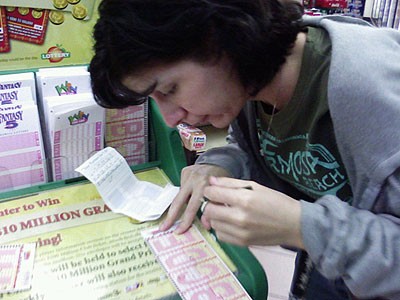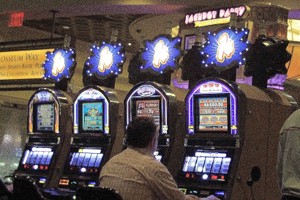Not every news outlet can boast a headline like Wednesday’s Atlanta Journal-Constitution’s “Winning Mega Millions ticket sold in Buckhead,” but chances are that people in your audience are sitting on a pile of unclaimed cash, too.
It’s doubtful that these winners – reportedly one in California, as well – will overlook their winning tickets. But since the results of the $636 million drawing will be in the zeitgeist for days to come – talk about your holiday miracles, given the odds – why not point readers to assets or winnings they may have forgotten to cash in?
(As to the odds, I saw Bill Nye, the Science Guy, on TV Tuesday night; he said we are more likely to be elected president of the United States, be killed by a vending machine or be hit by lightning twice on the same day than to hit the Mega-Million top jackpot.)
Back to unclaimed winnings: This CNN story from earlier in the week says that some $800 million in lotto prizes go begging each year; many winning tickets expire without ever being cashed in. I think your audience would enjoy a localized version of this story; contact your state’s lottery commissioner for statistics and as a sidebar, why not publish a list of the biggest unclaimed prize. (Ask for the location where the ticket was sold and print that, to help readers narrow down their possibilities; here’s an ABC News story pinpointing the liquor store that sold an unclaimed $1 million winner that’s expiring Jan. 6.)
The $800 million is surpassed by some $1 billion worth of unredeemed store gift cards floating around out there in wallets and desk drawers, according to a MarketWatch report. It’s an interesting personal finance story – especially given the consumer protections on gift cards put in place by the CARD Act of 2009 – but also a mixed blessing for merchants; they get basically free revenue when the cards go unused, but also an accounting headache. You might get some interesting examples from local or regional chains like hardware stores and supermarkets.
Other stray assets:
Unredeemed casino vouchers.
For the uninitiated (and fiscally prudent): One-armed bandits don’t spew cascades of coins any more, nor do they accept them. Bettors insert currency and when they either tire of the machine and want to cash-out unused credits, or win and wish to receive their payout, they press a button and the machine emits a tidy dollar-bill-sized voucher features the dollar amount, time stamp, bar code and other information.
Those vouchers can be inserted into a different machine or redeemed via kiosks and cashier windows for cash. Sometimes gamblers fold them into a purse or pocket, intending to use them next time, but forget. Sometimes the balance is a few cents and bettors just toss the slips.
A few casinos collect unwanted vouchers in charity wishing wells near their entrances, to show you how those few cents add up in the aggregate. Here’s a New York Times story about “voucher vultures” who prowl gaming halls looking for slips and uncashed credits; in Nevada the unclaimed vouchers total tens of millions of dollars a year kept by the casinos till the state demanded a piece of the pie. Like the unclaimed lotto story, this is fairly straightforward to report; ask your state’s gaming commission what the rules are and if casinos are required to report actual unclaimed dollars to regulators.
One question I’d like to ask casinos: They all have player rewards programs in which gamblers insert a credit-card type token into machines so the casinos can track their play. They track how often per minute a player spins, how much they’re betting, how much they win, how long they spend at a given machine and so on. At some casinos, the system alerts management when active players on the floor; I’ve seen casino “hosts” startle patrons by greeting them cheerily and offering to send a beverage or other amenity.
Point being, it is inconceivable to me that the casino cannot identify the owner of unclaimed vouchers, assuming a player was using a rewards card, and most do. Why then, are the amounts not somehow credited to the player, or converted to check and mailed out, or otherwise connected to their rightful owner via this powerful data mining? Casinos frequently send out three or four direct mail pieces a week to rewards club members, alerting them to special offers and promotions – not to mention e-mail – and many of these direct mail pieces are partially personalized. In addition to offers of bonus slot play, free buffets and comped hotel rooms, why on earth can’t the personalization say “Ms. Jones, you have an outstanding voucher balance of $3.98” ??
I’m sure they could, technologically, if the desire were there. So why aren’t they? According to this fascinating 2013 State of the States report from the American Gaming Association, one-third of Americans visited a casino in the prior 12 months, so plenty in your audience would likely be interested in the casinos’ response. Ask about expiration dates on vouchers, too. What do they mean and are they non-negotiable?
Unclaimed wager slips at horse-racing venues.
Similar to the casino slips, winning betting vouchers at tracks must be presented for redemption, and forgetful patrons may neglect to do so. Again, millions of dollars default back to track operators (and in some cases the state or charity) – or they are picked up by scavengers; this story from Saratoga, NY said people actually travel the racing circuit, supporting themselves from track to track on the proceeds from cast-off winners.
Beyond gambling.
You could have fun with a broader “unclaimed” story, like what happens to abandoned garments at dry cleaners – here’s a 2012 ad touting a fundraising sale featuring 1,500 pieces of cleaned and pressed clothing — or unclaimed luggage at airports, or things people leave behind in hotels, restaurants, buses and other public venues. What are lost-and-found policies and oddball items? (I read once that hotels never try to track down forgetful guests because they don’t want to inadvertently expose someone’s clandestine trip.) How about repair shops and jewelry stores? Car impound lots? What odds and ends of assets are Americans leaving in their wake these days, and what happens to it all?











